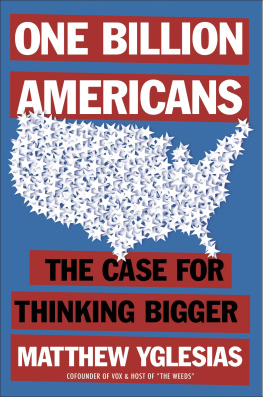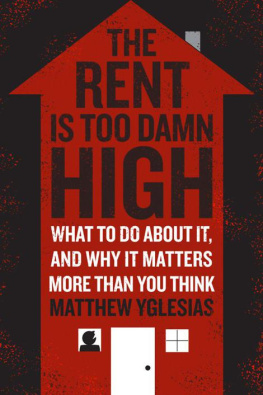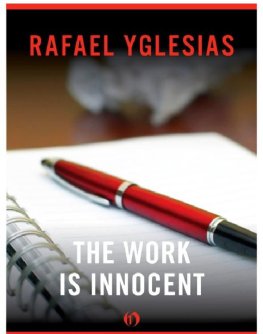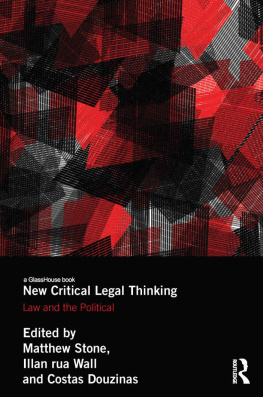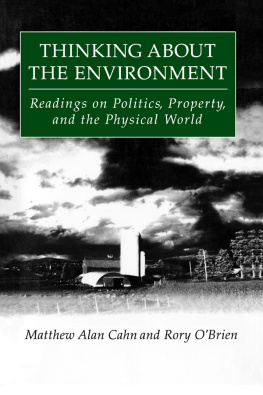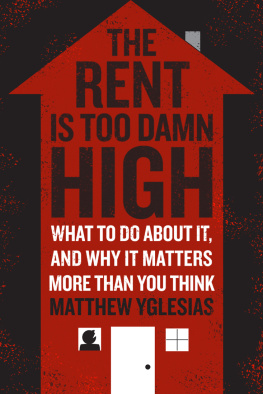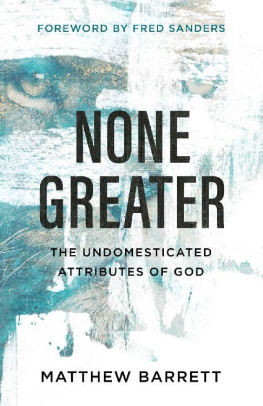Matthew Yglesias - The Case for Thinking Bigger
Here you can read online Matthew Yglesias - The Case for Thinking Bigger full text of the book (entire story) in english for free. Download pdf and epub, get meaning, cover and reviews about this ebook. year: 2020, publisher: Penguin Publishing Group, genre: Politics. Description of the work, (preface) as well as reviews are available. Best literature library LitArk.com created for fans of good reading and offers a wide selection of genres:
Romance novel
Science fiction
Adventure
Detective
Science
History
Home and family
Prose
Art
Politics
Computer
Non-fiction
Religion
Business
Children
Humor
Choose a favorite category and find really read worthwhile books. Enjoy immersion in the world of imagination, feel the emotions of the characters or learn something new for yourself, make an fascinating discovery.
- Book:The Case for Thinking Bigger
- Author:
- Publisher:Penguin Publishing Group
- Genre:
- Year:2020
- Rating:4 / 5
- Favourites:Add to favourites
- Your mark:
- 80
- 1
- 2
- 3
- 4
- 5
The Case for Thinking Bigger: summary, description and annotation
We offer to read an annotation, description, summary or preface (depends on what the author of the book "The Case for Thinking Bigger" wrote himself). If you haven't found the necessary information about the book — write in the comments, we will try to find it.
The Case for Thinking Bigger — read online for free the complete book (whole text) full work
Below is the text of the book, divided by pages. System saving the place of the last page read, allows you to conveniently read the book "The Case for Thinking Bigger" online for free, without having to search again every time where you left off. Put a bookmark, and you can go to the page where you finished reading at any time.
Font size:
Interval:
Bookmark:
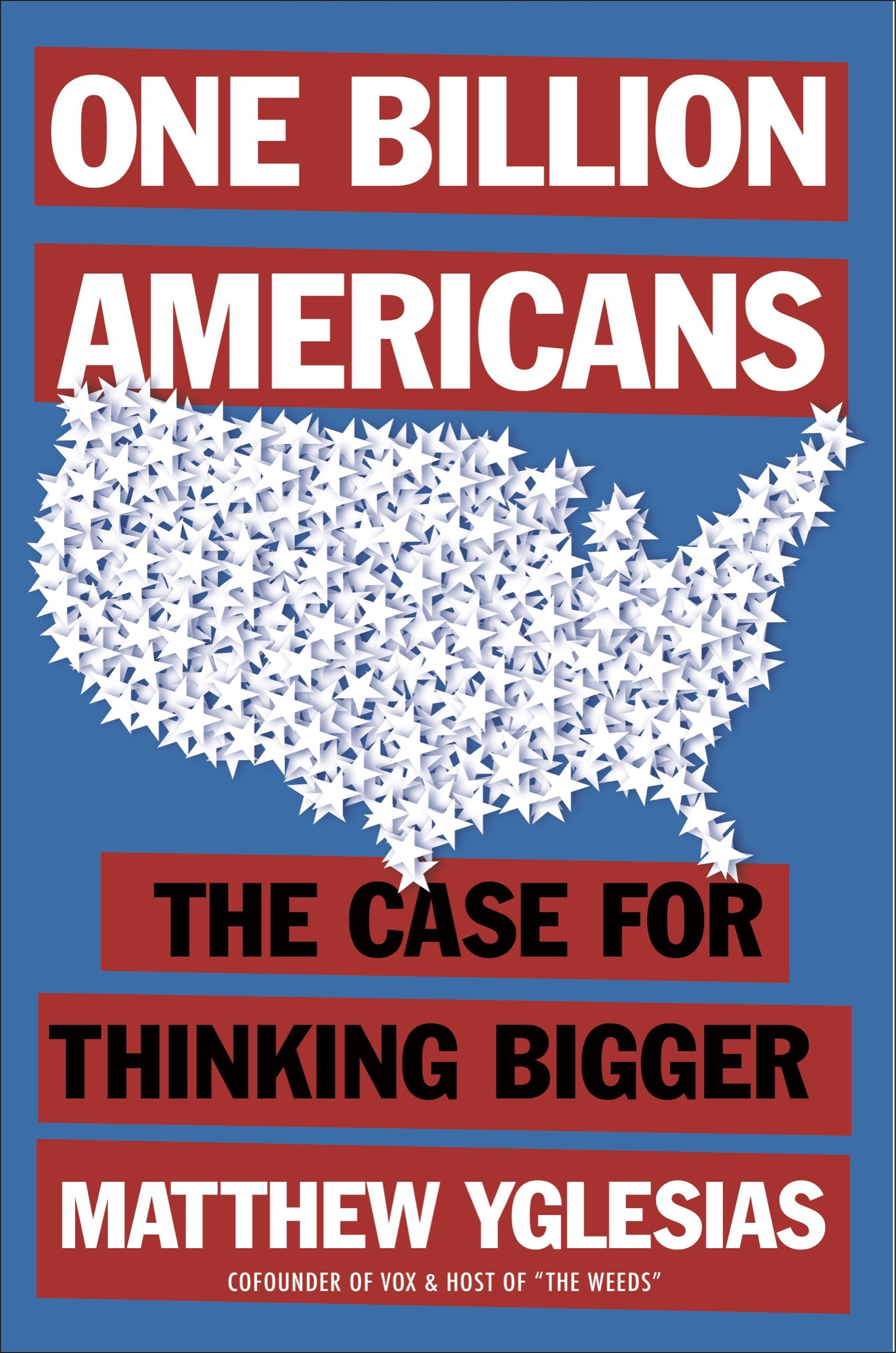
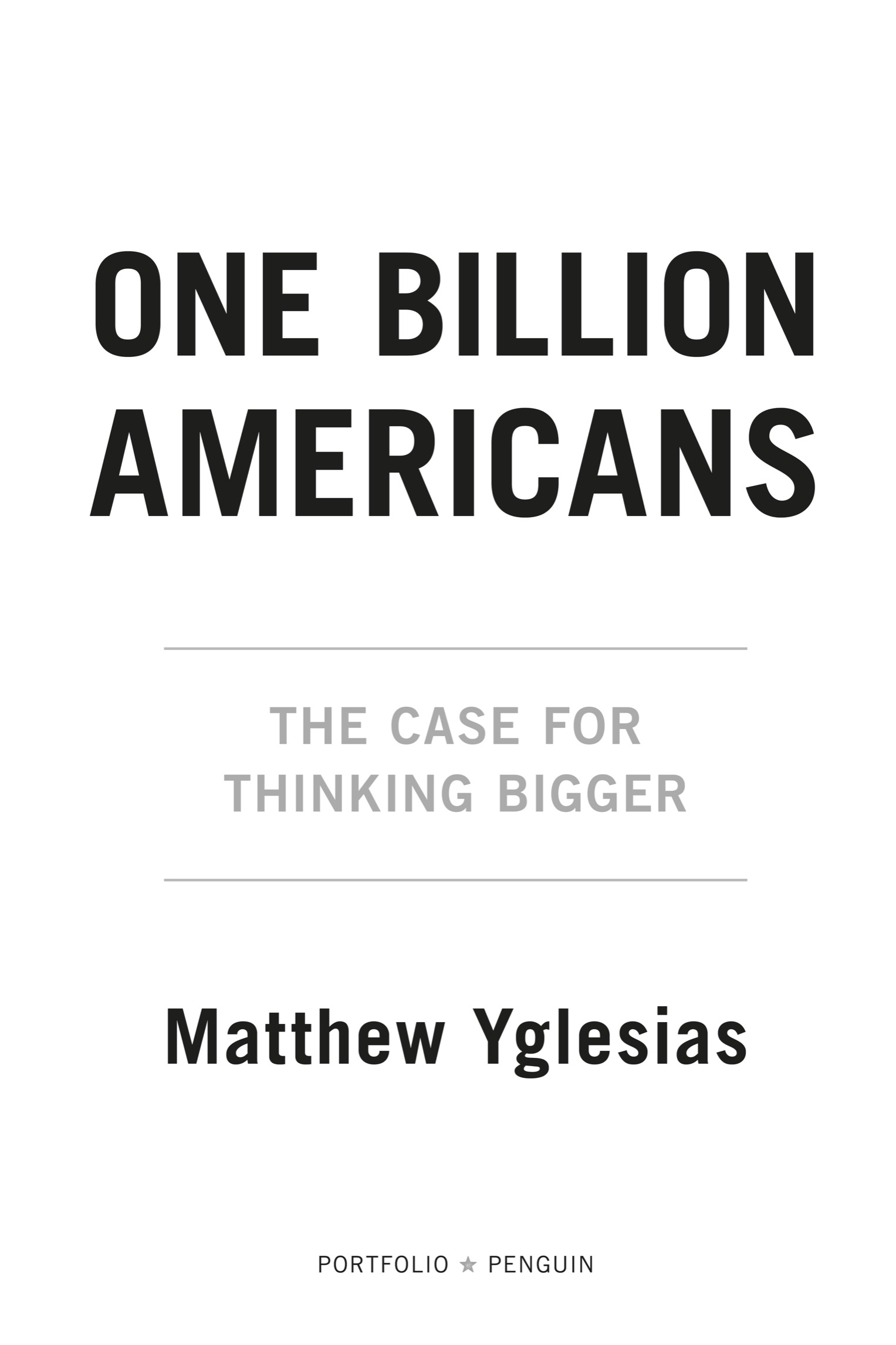

Portfolio / Penguin
An imprint of Penguin Random House LLC
penguinrandomhouse.com

Copyright 2020 by Matthew Yglesias
Penguin supports copyright. Copyright fuels creativity, encourages diverse voices, promotes free speech, and creates a vibrant culture. Thank you for buying an authorized edition of this book and for complying with copyright laws by not reproducing, scanning, or distributing any part of it in any form without permission. You are supporting writers and allowing Penguin to continue to publish books for every reader.
LIBRARY OF CONGRESS CATALOGING-IN-PUBLICATION DATA
Names: Yglesias, Matthew, 1981 author.
Title: One billion Americans: the case for thinking bigger / Matthew Yglesias.
Description: New York : Portfolio, 2020. | Includes bibliographical references.
Identifiers: LCCN 2020027461 | ISBN 9780593190210 (hardcover) | ISBN 9780593190227 (ebook)
Subjects: LCSH: United StatesPopulationEconomic aspects. | United StatesPopulationEnvironmental aspects. | Demographic transitionEconomic aspectsUnited States. | United StatesEmigration and immigrationGovernment policy. | United StatesEconomic conditions21st century.
Classification: LCC HB3505 .Y45 2020 | DDC 304.6/20973dc23
LC record available at https://lccn.loc.gov/2020027461
While the author has made every effort to provide accurate internet addresses and other contact information at the time of publication, neither the publisher nor the author assumes any responsibility for errors or for changes that occur after publication. Further, the publisher does not have any control over and does not assume any responsibility for author or third-party websites or their content.
pid_prh_5.6.0_c0_r0
For Kate, my one in a billion
The American political system has fallen into a state of torpor and dysfunction driven by, among other things, the absence of a shared sense of purpose.
Disagreement and debate are vital in a free society. But its also useful at times to have common goalssettle the West, beat the Nazis, win the Cold Warthat structure the disagreements. What weve been doing lately isnt so much debating how to proceed as a country as it is simply fighting with one another. And now the country faces a very real challenge that we must meet: rapid ongoing economic growth in India and especially China is leading to the relative decline of the United States of America as a great power and threatens its position as the worlds number one state in the not-too-distant future.
Contemporary American politicians give no sign of wanting to accept that decline, but theyre also not proposing to do anything about it. Theres no way that all the specific ideas in this book will ever command broad consensus in American society. But I think the big picture idea of the book, that America should try to stay number one, already does. The question is what follows from that.
For starters, it is beyond dispute that there are fewer American people than there are Chinese or Indian people, as is the fact that China and India are trying to become less poor and seem to be succeeding. Maybe theyll just stumble and fail, in which case we will stay number one. But it would be unfortunate for hundreds of millions of people to be consigned to poverty forever. Its not an outcome we have it within our power to guarantee. And even if we could, it would be hideously immoral to pursue it.
By contrast, tripling the nations population to match the rising Asian powers is something that is in our power to achieve. It would require more immigrants and more programs to support people who want to have additional children. And of course if we had a lot more people, wed need to adjust a number of other things to make sure they had jobs and places to live. Working out the exact details of how best to structure family support programs, how best to pay for them, exactly which additional immigrants to let in, and how to improve our infrastructure and increase our housing stock are good things to argue about. The ideas laid out in this book are the best ones I could find. But nothing will command universal assent or be beyond the realm of political dispute and political bargaining.
But think of how much healthier our politics would be if there were really a debate about how to accomplish great things rather than a food fight over semi-imagined offenses to real Americans that serves as a mask for an endless procession of tax cuts for the rich. Why not make America greater than ever instead?
Conservatives argue that the country is full and we cant take more immigrants. Progressives tend to disagree, even while being inclined to say that the particular towns and cities they live in are full and dont need more real estate development. Americas birth rate has slipped to historic lows and nobody in the political mainstream seems to think we can or should do anything about it. Meanwhile, the seemingly unstoppable rise of China as a world power hangs like a dark cloud over American politics.
None of this is right.
Early in my career, I focused largely on foreign policy topics. But for more than a decade, Ive primarily covered domestic issues. And as Ive done so, Ive been struck by the growing popularity of the view that somehow foreignerswhether through immigration or tradeare to blame for our various domestic problems.
The truth is exactly the reverse. We didnt prosper in the late twentieth century because we won the Cold War; we won the Cold War because our underlying political and economic system was a lot better than Soviet communism. Today our international situation is imperiled because we have let a staggering array of lingering problems fester and prevent us from becoming as big and as rich a country as we ought to be.
But the United States is not full. Many of its iconic citiesincluding not just famous cases of collapse like Detroit but also Philadelphia and Chicago and dozens of smaller cities like Rochester and Erieactually have fewer residents than they had decades ago. And virtually all of our thriving cities easily have room to grow and accommodate more people.
And we should accommodate more people. Immigrants of virtually all stripes help make native-born Americans richer, make our retirement programs more sustainable, and offer the fuel for innovation that can help the country grow. Housing shortages are endemic in many parts of the country, but the tools to surmount them are easily available andlike immigrationwould cost taxpayers nothing. Providing adequately for Americas familiesby offering not just paid leave but financial assistance, preschool and aftercare services, reasonable summer programming, and affordable college for all qualified studentswould cost money. But it would greatly benefit Americas children and make it much easier for middle-class people to have the number of kids they say they want.
As a policy reporter, Im much more a generalist than a specialist. And I like doing stories about solutions. Like many people, when I look at something long enough I start to see patterns in it.
Font size:
Interval:
Bookmark:
Similar books «The Case for Thinking Bigger»
Look at similar books to The Case for Thinking Bigger. We have selected literature similar in name and meaning in the hope of providing readers with more options to find new, interesting, not yet read works.
Discussion, reviews of the book The Case for Thinking Bigger and just readers' own opinions. Leave your comments, write what you think about the work, its meaning or the main characters. Specify what exactly you liked and what you didn't like, and why you think so.

